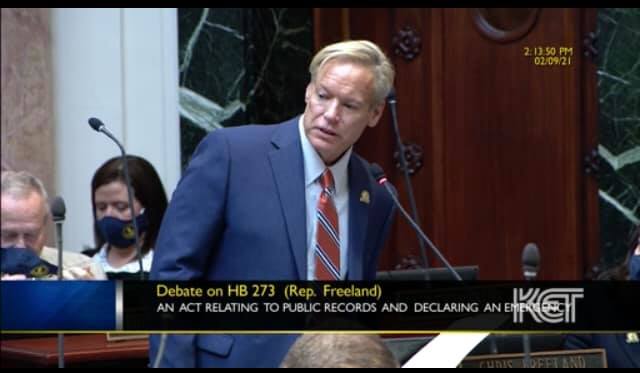
Without discussion, a bill creating a new exception to the Kentucky open records law, cleared the House by a vote of 93-1 today. It now heads to the Senate.
https://apps.legislature.ky.gov/record/21rs/HB273.html
HB 273 authorizes public agencies to deny the public access to "photographs or videos that depict the death, killing, rape, or sexual assault of a person." The bill does not apply to police body cam video — which is governed by KRS 61.168 — and the "photographs or videos shall be made available at the request of any party who was involved in the underlying incident."
Characterizing his bill to assembled lawmakers as "a way to protect families," Rep. Chris Freeland twice offered assurances that HB 273 only applies to photos and videos "in the possession of the courts."
Freeland — whose district encompasses Marshall County — explained that he was approached by the prosecutors in the Marshall County High School shooting case. Early in the prosecution, they expressed concern about release of a video of the shooting and the re-traumatization of the families of the students who were murdered.
The prosecutors asked Freeland for corrective legislation. HB 273 is the result.
Freeland offered assurances that the bill was not an attack on the media — which practices responsible use of such photos and videos — but was instead a measure aimed at "catching up" our open records law to new technologies.
Makes sense, right?
Wrong.
The open records law does not apply to photos and videos in the possession of the courts. Any exception that is limited to court records is a nullity. In 1978, the Kentucky Supreme Court firmly and emphatically stated that "the custody and control of the records generated by the courts in the course of their work are inseparable from the judicial function itself, and are not subject to statutory regulation."
https://law.justia.com/cases/kentucky/supreme-court/1978/570-s-w-2d-617…
The "statutory regulation" to which the Court referred was the open records law.
This evening, a newspaper publisher asked what I thought of HB 273.
This is how I responded.
"I'm with the one lawmaker who voted against it.
"I have written about this bill til I am blue in the face. With perhaps the exception of the lawmaker who cast the single "no" vote, no lawmaker — including the sponsor — has the faintest clue what this bill does.
https://www.facebook.com/419650175248377/posts/857468471466543/?d=n
https://www.facebook.com/419650175248377/posts/857779554768768/?d=n
https://www.facebook.com/419650175248377/posts/846229425923781/?d=n
"The sponsor says it only applies to photos and videos in the possession of the courts. The bill does not contain any such limitation.
"The word 'court' does not even appear in HB 273.
"And if the bill *did* contain such limiting language, it would be a legal nullity. In 1978, the Supreme Court expressly rejected legislative regulation of its records. The Court was addressing the open records law.
"The open records law does not govern access to records of the courts and judicial agencies.
"What the House passed is a bill that will enable *any* public agency that has a photo or video, as described, to flatly deny access to that photo or video without weighing the competing public and private interests.
"Why is this bad when the photos or videos depict incidents that implicate substantial privacy rights?
"Because in some cases there is a compelling public interest in disclosure. That public interest is premised on the public's right to know how a public employee or official conducted his public duties or an agency discharged it statutory obligations. In some cases that public interest outweighs the privacy interests that are implicated.
"Some examples.
"A correctional facility may have surveillance video of a sexual assault by a staff member that repudiates the staff member's claim that the incident was consensual or that bears on the appropriateness of the disciplinary measures (or lack thereof) imposed on the staff member. The public's right to know how the employee as well as the agency conducted their duties is advanced by disclosure.
"Occupational safety and health officials may have a video of a workplace fatality resulting from a failure to provide adequate employee safeguards. The video again has a direct bearing on the appropriateness of the penalties imposed by the public officials.
"And, of course, the obvious example, a law enforcement agency may possess bystander or surveillance video that depicts an officer's excessive use of force resulting in the death of a person (think George Floyd, David Atta, or Rayshard Brooks) or, conversely, that vindicates the officer based on appropriate use of force.
"These are the photographs and videos to which the new exception *by its express terms* applies — not photographs and videos in the courts' possession.
"And, again, the courts' records are not subject to the open records law.
"The existing privacy exception in the open records law strikes the appropriate balance between the public and private interests. Often the public interest will yield to the privacy interests and denial of access to the photo or video will be affirmed. But the new exception does not allow for the possibility that there can ever be a superior public interest.
https://apps.legislature.ky.gov/law/statutes/statute.aspx?id=49156 (see, subsection(1)(a)).
"This is not speculation. As an assistant attorney general I reviewed cases like these. Some were resolved in favor of, and *some against*, public access.
"Make no mistake. This exception *will* be abused by agencies to conceal misconduct. There is simply no doubt.
"And the legislators who enacted it without understanding it, without discussing it, and with no comprehension of what HB 273 actually does, applaud themselves and will sleep soundly tonight."
Open government advocates will not sleep soundly tonight.


